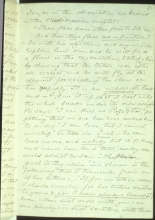Page 29
For, as in the observation embodied in the Hudibrasian couplet:
"These fleas have other fleas to bite 'em,
And these — their fleas ad infinitum . . . ."
— so with his objections and arguments. Explain him one, and he will find a flaw in the explanation; satisfy him by showing that the latter was after all correct, and he will fly at the opponent for speaking too slow or too rapidly. It is an IMPOSSIBLE task — and I give it up. Let it last until the whole breaks under its own weight. He says "I can kiss no Pope's toe," forgetting that no one has ever asked him to do so; "I can love, but I cannot worship" he tells me. Gush — he can love no one, and nobody but A. O. Hume, and never has. And that really, one could almost exclaim "Oh Hume, — gush is thy name!" — is shown in the following that I transcribe from one of his letters: "If for no other reason, I should love M. for his entire devotion to you — & you I have always loved (!). Even when most cross with you — as one always is most sensitive with those



Hudibrasian is a verse form of iambic tetrameter in closed couplets. The word is derived from the satiric work Hudibras, a mock-heroic 17th-century narrative poem by Samuel Butler.
These fleas was a quotation from Jonathan Swift, or a similar line by Augustus de Morgan.